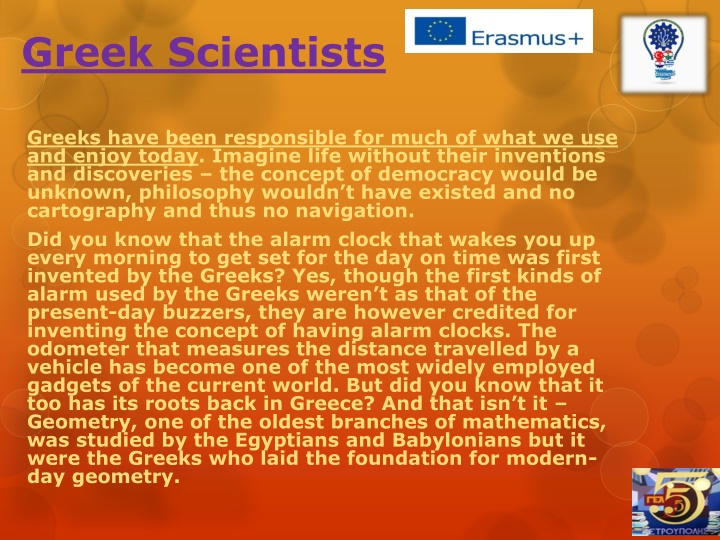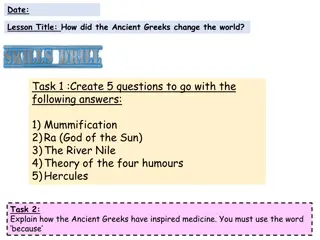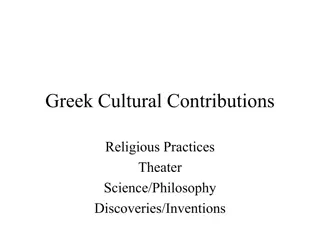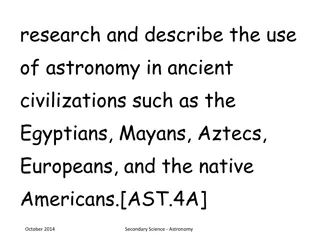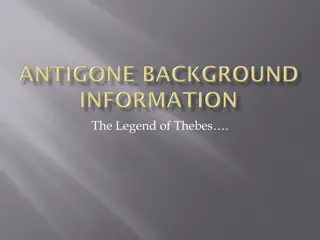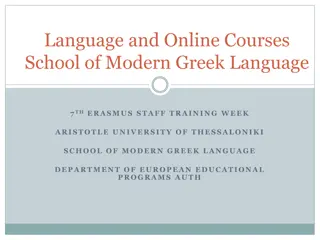Contributions of Greek Scientists to Modern Society
Greeks have made significant contributions to modern society through their inventions and discoveries. Without their innovations, concepts like democracy, philosophy, cartography, and navigation would be unknown. Greek scientists like Thales of Miletus, Aristotle, and Pythagoras laid the foundation for modern fields such as geometry, medicine, and mathematics. Their intellectual pursuits in various disciplines have left a lasting impact on civilization, shaping the way we live today.
Download Presentation

Please find below an Image/Link to download the presentation.
The content on the website is provided AS IS for your information and personal use only. It may not be sold, licensed, or shared on other websites without obtaining consent from the author.If you encounter any issues during the download, it is possible that the publisher has removed the file from their server.
You are allowed to download the files provided on this website for personal or commercial use, subject to the condition that they are used lawfully. All files are the property of their respective owners.
The content on the website is provided AS IS for your information and personal use only. It may not be sold, licensed, or shared on other websites without obtaining consent from the author.
E N D
Presentation Transcript
Greek Scientists Greeks have been responsible for much of what we use and enjoy today. Imagine life without their inventions and discoveries the concept of democracy would be unknown, philosophy wouldn t have existed and no cartography and thus no navigation. Did you know that the alarm clock that wakes you up every morning to get set for the day on time was first invented by the Greeks? Yes, though the first kinds of alarm used by the Greeks weren t as that of the present-day buzzers, they are however credited for inventing the concept of having alarm clocks. The odometer that measures the distance travelled by a vehicle has become one of the most widely employed gadgets of the current world. But did you know that it too has its roots back in Greece? And that isn t it Geometry, one of the oldest branches of mathematics, was studied by the Egyptians and Babylonians but it were the Greeks who laid the foundation for modern- day geometry.
Thales of Miletus Thales of Miletus is regarded as the Father of Geometry. He was responsible for setting up a number of axioms and rules that were based on reasoning. Did you know that ancient civilization believed that diseases were God s way of punishing humans? It were the Greeks who started the practice of medication. Greek scientists have thus contributed greatly for the society and the civilization. Read this section to know more about famous Greek scientists.
Aristotelis oAristotle was a Greek philosopher and scientist, better known as the teacher of Alexander the Great. oHe was a student of Plato and is considered an important figure in Western Philosophy. Famous for his writings on physics, metaphysics, poetry, theater, music, logic, rhetoric, linguistics, politics, government, ethics, biology, and zoology, he is considered much ahead of his time. oHis writings constitute the first comprehensive system of Western philosophy which includes views about morality and aesthetics, logic and science, politics and metaphysics.
Aristotle oHis intellectual knowledge ranged from every known field of science and arts of that era. His writing includes work in physics, chemistry, biology, zoology, botany, psychology, political theory, logic, metaphysics, history, literary theory and rhetoric. oOne of his greatest achievements was formulating a finished system also known as Aristotelian syllogistic. His other significant contribution was towards the development of zoology. It is true that Aristotle s zoology is now obsolete but his work and contribution was unchallenged till the 19th century. His contribution towards almost all subjects on earth and its influence makes him one of the most famous and top personalities of all time
Pythagoras o Pythagoras was an Ionian philosopher and mathematician, born in sixth century BC in Samos. o Most of the information available today has been recorded a few centuries after his death and as a result, many of the available accounts contradict each other. However, this much is certain that he was born to a merchant from Tyre and had studied under various teachers since his early childhood. When he was around forty years old, he left Samos. Some say he went to Egypt to study under the temple priests and returned after fifteen years while others say that he went straight to Croton to open a school
Pythagoras oNonetheless, it is certain that his main place of activity was Croton and there he set up a brotherhood and made important contribution to mathematics, philosophy and music. His followers, known as Pythagoreans, maintained strict loyalty and secrecy. Another established fact is that Pythagoras travelled extensively. o Some accounts also claim that he went to India to study under Hindu Brahmins. Contradiction also exists about his death; but there is unanimity that he was hounded and killed by his enemies. .
Archimedes o Archimedes of Syracuse was an outstanding ancient Greek mathematician, inventor, physicist, engineer and also an astronomer. o Although not much is known about his life, he is considered as one of the most eminent scientists and mathematicians of the classical era. He established strong foundations in the field of mathematics, physics, particularly in statics, hydrostatics and also explained the principle of the lever. o In his lifetime, he made many incredible inventions such as designing innovative machines, including screw pumps, compound pulleys and siege machines. o He is said to have anticipated modern calculus and analysis and derived a range of geometrical theorems, including the area of a circle, the surface area and volume of a sphere, and the area under a parabola. He applied the method of exhaustion in calculating the area under the arc of a parabola with the summation of an endless series and gave a precise approximation of pi. o He also identified the spiral that bears his name, designed formulae for the volumes of surfaces of revolution and also invented a technique for expressing extremely large numbers..
Archimedes While the inventions of Archimedes were known in the antiquity but his mathematical writings were little known. The first comprehensive compilation of his mathematical writings was not made until c. 530 AD by Isidore of Miletus. The commentaries on the works of Archimedes written by Eutocius in the sixth century AD opened them to a wider audience for the first time. Only a few copies of Archimedes' written work survived through the middle ages and became an influential source of ideas for scientists during the Renaissance. In addition to that, the discovery in 1906 of unknown works by Archimedes in the Archimedes Palimpsest has thrown new light into how he obtained mathematical results
Eratosthenes oThe Greeks were the earliest discoverers of much of the knowledge that went on to lay the foundations of scientific studies for thousands of years and one of the most important figures from that period is undoubtedly Eratosthenes, who was a mathematician, geographer as well as an astronomer of rare quality. o Additionally he was also a music theorist which well and truly shows the sort of versatile knowledge and gifts that he possessed o Eratosthenes was responsible for bring to notice some of the most important discoveries in geography, astronomy and mathematics. Born in the Cyrene, the young lad was remarkably curious from an early age..
Eratosthenes He pursued higher education from Athens where he was taught by the best teachers of the day. Aristo of Chios and Arcesilaus in particular left a lasting impression on the budding philosopher. His reputation as a mathematician was affirmed when he measured the circumference of the earth using the shadows cast by the sun. He also made immense contribution to the field of geography by demarcating the five different climate zones existing in the earth. In fact the term geography was also coined by this eminent scientist. It can be unarguably said that this erudite scientist made discoveries that were way ahead of his time. Read on to know more about his life and works
Hipparchus oHipparchus was a Greek astronomer and mathematician. He is known for discovering the change in the orientation of the Earth s axis and the axis of other planets with respect to the center of the Sun. o He was also the inventor of trigonometry. He had immense in geography and was one of the most famous astronomers in ancient times. He made the first models of the motion taken by the Sun and the Moon which are considered very accurate even in modern times. It is believed that he had used the mathematical formulas derived by the Mesopotamians and the Babylonians over the centuries to arrive at his conclusions. He was the founder of trigonometric tables and was the first one to solve many of the problems related to the trigonometry of spheres. He was possibly the first astronomer to predict the occurrence of solar eclipses with the help of trigonometry and his theories on the movement of the Sun and the Moon. His other great discovery was the accurate calculation of the equinox precession, creation of the first star catalog in the western world, development of the astrolabe and the armillary sphere . His discoveries and creations could only be superseded after three centuries by Claudius Ptolemaeus. Very few documents are available on his life and works. o
Hipparchus oHe was the founder of trigonometric tables and was the first one to solve many of the problems related to the trigonometry of spheres. He was possibly the first astronomer to predict the occurrence of solar eclipses with the help of trigonometry and his theories on the movement of the Sun and the Moon. oHis other great discovery was the accurate calculation of the equinox precession, creation of the first star catalog in the western world, development of the astrolabe and the armillary sphere . His discoveries and creations could only be superseded after three centuries by Claudius Ptolemaeus. Very few documents are available on his life and works.
Constantin Carath odory oGerman mathematician of Greek origin who made important contributions to the theory of real functions, to the calculus of variations, and to the theory of point-set measure. oAfter two years as an assistant engineer with the British Asy Dam project in Egypt, Carath odory began his study of mathematics at the University of Berlin in 1900. o In 1902 he entered the University of G ttingen, where he received a Ph.D. (1904) under the German mathematician Hermann Minkowski. After teaching at the Universities of Hannover (1909), Breslau (1910 13), G ttingen (1913 18), and Berlin (1918 20), he accepted a post at the University of Smyrna, which the Greeks were setting up in Anatolia. When the Turks razed Smyrna in 1922, Carath odory managed to save the university library, which he moved to the University of Athens, where he taught until 1924.
Constantin Carath odory oHe then was appointed professor of mathematics at the University of Munich. Carath odory s contributions to the calculus of variations included a comprehensive theory of discontinuous solutions, in which previously there had been only limited findings. He also added important results to the relationship between first-order partial differential equations and the calculus of variations. oHis work on the problems of variation of m-dimensional surfaces in an n-dimensional space marked the first far- reaching results for the general case. He contributed important findings to the theory of the functions of several variables and simplified the proof of the main theorem of conformal representation of simply connected regions on the unit-radius circle. His investigations of the geometrical- set theoretic properties of boundaries resulted in his theory of boundary correspondence. He also contributed to thermodynamics.
